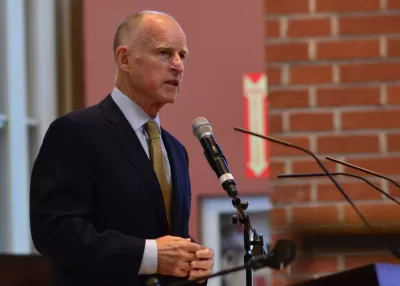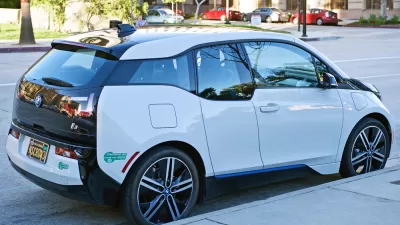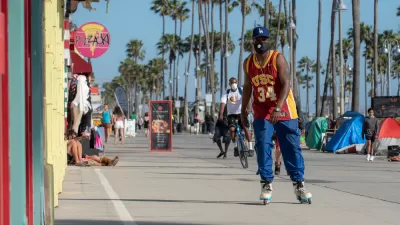A three-day global summit on climate action in San Francisco, hosted by Gov. Jerry Brown, is unlike other international climate summits in that it features "non-state actors," such as governors, mayors, and businesses, rather than nations.

"At the international climate summit Gov. Jerry Brown will kick off Wednesday in San Francisco, the state is playing a role none ever has, pushing the rest of the country to join other nations in enforcing a landmark agreement on climate change that President Trump has quit," reports Evan Halper for the Los Angeles Times.
Put simply, the three-day environmental summit will test whether California can bring the country to a place Congress and the White House won’t.
Indeed, as the Trump administration prepared this week to ease regulations on methane, one of the most potent greenhouse gases, many states are looking to follow California and Colorado in pursuing policies that require energy firms to capture the methane their drilling operations release and convert it into electricity.
California’s new law — signed Monday — putting the state on a path to 100% renewable energy could motivate others to make similar pledges this week.
"This summit, which Brown is co-hosting with former New York Mayor Michael Bloomberg and a bevy of international officials, aims to advance that staid model [in which political figures discuss what can be done to address climate change, sign declarations, adjourn and meet again later, somewhere else] by including a broad group of 'non-state actors'—mayors, governors and leaders representing regions rather than entire countries," reported Julie Cart for CALmatters.
Brown’s extensive networking will come into play, as will two organizations he helped found. One is the Under2 Coalition, a group of more than 200 governments vowing to prevent global temperatures from rising more than two degrees Celsius.
A second grew out of his partnership with Bloomberg: America’s Pledge, a mix of states, cities and businesses that vow to adhere to the emission reductions set out in the Paris climate accord.
A new report prepared for the summit, "Global Climate Action from Cities, Regions, and Businesses" [pdf] "projects that despite a retreat by the federal government, a serious push from the bottom-up could put the U.S. within reach of its Paris emissions goals by 2025," reports Craig Miller for KQED, the Bay Area NPR affiliate (audio available).
"That still leaves a long way to go," adds Halper. "The summit will test how much cities, states and the private sector can do to fill the gap."
Nonpartisan even in Trump era
"Although many summit attendees may view Trump as a villain, Los Angeles Mayor Eric Garcetti said climate change should not be seen as a partisan issue," adds Halper
More than a few Republicans will attend. And he notes that the largest American city running on 100% renewable power now is Georgetown, Texas, a conservative community of 67,000 people with a Republican mayor.
Ultimately the summit will be "a test of how much cities, states and the private sector can do to fill the gap" left by President Trump's withdrawal from the Paris Climate Agreement, adds Halper.
Miller, KQED's science editor, reports that commitments to climate action from those non-state actors and sub-national governments who are central to doing the work of meeting the goals of the Paris Agreement have been rolling in even before the summit convened.
FULL STORY: How far can California push the nation — and the world? Jerry Brown's climate summit may provide the answer

Alabama: Trump Terminates Settlements for Black Communities Harmed By Raw Sewage
Trump deemed the landmark civil rights agreement “illegal DEI and environmental justice policy.”

Study: Maui’s Plan to Convert Vacation Rentals to Long-Term Housing Could Cause Nearly $1 Billion Economic Loss
The plan would reduce visitor accommodation by 25% resulting in 1,900 jobs lost.

Why Should We Subsidize Public Transportation?
Many public transit agencies face financial stress due to rising costs, declining fare revenue, and declining subsidies. Transit advocates must provide a strong business case for increasing public transit funding.

Wind Energy on the Rise Despite Federal Policy Reversal
The Trump administration is revoking federal support for renewable energy, but demand for new projects continues unabated.

Passengers Flock to Caltrain After Electrification
The new electric trains are running faster and more reliably, leading to strong ridership growth on the Bay Area rail system.

Texas Churches Rally Behind ‘Yes in God’s Back Yard’ Legislation
Religious leaders want the state to reduce zoning regulations to streamline leasing church-owned land to housing developers.
Urban Design for Planners 1: Software Tools
This six-course series explores essential urban design concepts using open source software and equips planners with the tools they need to participate fully in the urban design process.
Planning for Universal Design
Learn the tools for implementing Universal Design in planning regulations.
Caltrans
Smith Gee Studio
Institute for Housing and Urban Development Studies (IHS)
City of Grandview
Harvard GSD Executive Education
Toledo-Lucas County Plan Commissions
Salt Lake City
NYU Wagner Graduate School of Public Service




























